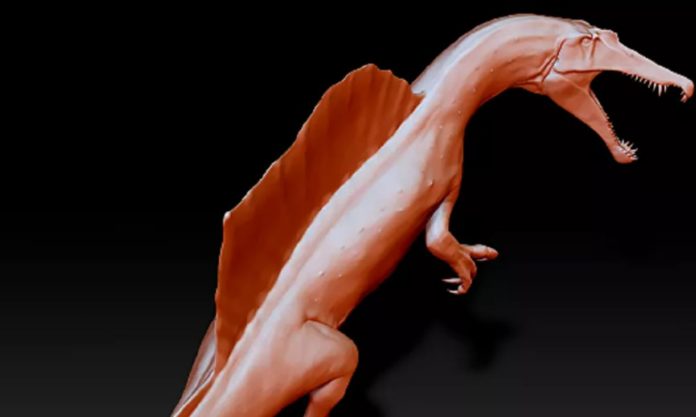Scientists from the Queen Mary University of London and the University of Maryland suggest that the giant dinosaur ‘Spinosaurus’ was not well adapted to the life of a water-chasing predator.
The giant animal was previously thought to be largely an aquatic predator, using its large tail to swim and actively chase fish in the water. The new study states that although it likely fed on water, and may have swum, it caught fish from shore and any other small prey available on land or in water as wading birds do.
- Scientists in Fear of This New Predator From Red Sea Eating Native Species in Mediterranean
- Does This Mean We Stopped Being Animal and Started Being Human Due to ‘Copy Paste’ Errors?
- The One Lifestyle Choice That Could Reduce Your Heart Disease Risk By More Than 22%
- Aging: This Is What Happens Inside Your Body Right After Exercise
- Immune-Boosting Drink that Mimics Fasting to Reduce Fat – Scientists ‘Were Surprised’ By New Findings
The researchers compared Spinosaurus’ features to the skulls and skeletons of other dinosaurs and various living and extinct reptiles that lived on land, in water, or both. One of the key tests uncovered by the researchers was related to the dinosaur’s ability to swim.
Spinosaurus had already been shown to be a less efficient swimmer than a crocodile, but it also has fewer muscles in its tail than a crocodile and, due to its size, would have much more endurance in the water.
“Crocodiles are excellent in water compared to land animals, but they are not as specialized for aquatic life and they are not able to actively chase fish. If the ‘Spinosaurus’ had less muscles in the tail, less efficiency and more drag, then it’s hard to see how these dinosaurs could chase fish in a way that crocodiles can’t,” said Dr David Hone, Queen Mary Senior Lecturer and lead author of the project.
However, the evidence points to Spinosaurus feeding partly, even for the most part, on water, probably more than any other large dinosaur.
“Some recent studies have suggested that it was actively chasing fish in the water, but although they could swim, they would not have been fast or efficient enough to do so effectively. Our findings suggest that the idea of wading is much more supported, albeit slightly less exciting,” added Hone.
The paleontologists’ findings do not match the attributes one might expect in an otter-like water-chasing predator, a sea lion or a short-necked plesiosaur, detailed co-author Tom Holtz, senior professor of vertebral Paleontology at the University of Maryland.
“Spinosaurus was a strange animal, even by the standards of dinosaurs, and it is not like anything that is alive today,” he said.
- Scientists in Fear of This New Predator From Red Sea Eating Native Species in Mediterranean
- Does This Mean We Stopped Being Animal and Started Being Human Due to ‘Copy Paste’ Errors?
- The One Lifestyle Choice That Could Reduce Your Heart Disease Risk By More Than 22%
- Aging: This Is What Happens Inside Your Body Right After Exercise
- Immune-Boosting Drink that Mimics Fasting to Reduce Fat – Scientists ‘Were Surprised’ By New Findings
Since its discovery in 1915, the biology and behavior of the massive Spinosaurus have puzzled paleontologists around the world.
Originally found in Egypt, Spinosaurus is believed to be one of the largest carnivorous dinosaurs to ever exist. It is estimated that it probably exceeded 15 m in length.
The first known Spinosaurus fossils were discovered in 1915 in Egypt and destroyed by the bombings of Munich during World War II. Today, paleontologists have 20 specimens of Spinosaurus. The new study was published in the journal Palaeontologia Electronica.
